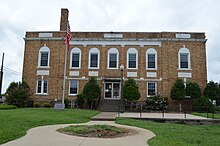Hickman County, Tennessee
| Hickman County, Tennessee | |
|---|---|

Hickman County Courthouse in Centerville
|
|
|
Location in the U.S. state of Tennessee |
|
 Tennessee's location in the U.S. |
|
| Founded | 1807 |
| Named for | Edwin Hickman, explorer |
| Seat | Centerville |
| Largest town | Centerville |
| Area | |
| • Total | 613 sq mi (1,588 km2) |
| • Land | 612 sq mi (1,585 km2) |
| • Water | 0.1 sq mi (0 km2), 0.02% |
| Population | |
| • (2010) | 24,690 |
| • Density | 40/sq mi (15/km²) |
| Congressional district | 7th |
| Time zone | Central: UTC-6/-5 |
| Website | hickmanco |
Hickman County is a county located in the U.S. state of Tennessee. As of the 2010 census, the population was 24,690. Its county seat is Centerville.
Hickman County is part of the Nashville-Davidson–Murfreesboro–Franklin, TN Metropolitan Statistical Area.
Hickman County was named for Edwin Hickman, an explorer and surveyor who was killed in an Indian attack at Defeated Creek in 1791. The county was established in 1807, and named for Hickman at the suggestion of Robert Weakley, a legislator who had been a member of Hickman's surveying party.
Hickman and the Duck River valley was originally claimed by the Chickasaw people of western Tennessee and northern Mississippi. Among its first white settlers was John Gordon, the famous "Captain of the Spies" who later fought at Horseshoe Bend and at Pensacola under Andrew Jackson. Gordon acquired land in Chickasaw territory in what is now Hickman County on the banks of the Duck River, where, in a partnership with Chief William "Chooshemataha" Colbert, he operated a ferry and Indian trading post for settlers traveling on the Natchez Trace. The trace was a war-path later made into a federal road for settlers moving from Tennessee to the lower Mississippi territory. The Chickasaw ceded the land to Tennessee in 1805 and Gordon kept the estate, moving his family there in 1812 and eventually amassing a plantation of over 1500 acres. The Gordon house still stands by the Duck River today, now maintained by the Natchez Trace National Parkway.
...
Wikipedia
